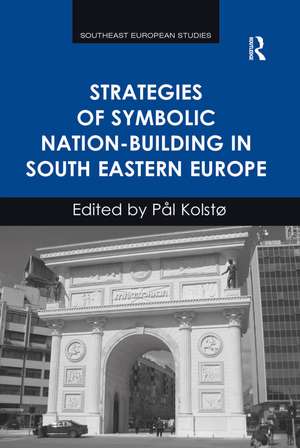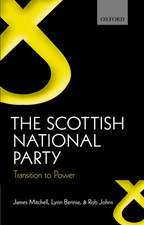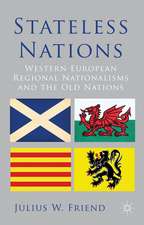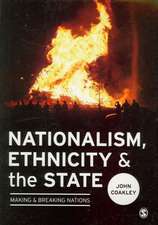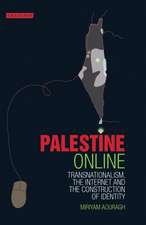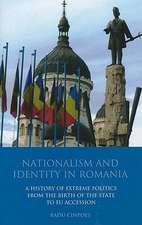Strategies of Symbolic Nation-building in South Eastern Europe
Autor Pål Kolstøen Limba Engleză Paperback – 14 oct 2016
| Toate formatele și edițiile | Preț | Express |
|---|---|---|
| Paperback (1) | 352.18 lei 6-8 săpt. | |
| Taylor & Francis – 14 oct 2016 | 352.18 lei 6-8 săpt. | |
| Hardback (1) | 824.34 lei 6-8 săpt. | |
| Taylor & Francis – 12 mar 2014 | 824.34 lei 6-8 săpt. |
Preț: 352.18 lei
Preț vechi: 402.32 lei
-12% Nou
Puncte Express: 528
Preț estimativ în valută:
67.40€ • 70.28$ • 56.01£
67.40€ • 70.28$ • 56.01£
Carte tipărită la comandă
Livrare economică 21 martie-04 aprilie
Preluare comenzi: 021 569.72.76
Specificații
ISBN-13: 9781138253216
ISBN-10: 1138253219
Pagini: 300
Dimensiuni: 156 x 234 mm
Greutate: 0.5 kg
Ediția:1
Editura: Taylor & Francis
Colecția Routledge
Locul publicării:Oxford, United Kingdom
ISBN-10: 1138253219
Pagini: 300
Dimensiuni: 156 x 234 mm
Greutate: 0.5 kg
Ediția:1
Editura: Taylor & Francis
Colecția Routledge
Locul publicării:Oxford, United Kingdom
Notă biografică
Pål Kolstø is Professor of Russian and East European Studies at the University of Oslo and has written extensively on nation-building and ethnic issues in Russia and Eastern Europe.
Recenzii
’The contributors to this timely collection of essays analyse brilliantly the complicated and conflicted on-going process of how multi-ethnic republics of an imploded federation search for symbols of their newly independent nation-states. While Montenegro, Serbia and Croatia can refer to traditional, yet partly contested symbols, Macedonia and Kosovo cannot.’ Stefan Troebst, University of Leipzig, Germany ’Much has been written on nationalism in Southeastern Europe, yet we know little about popular attitudes towards the envisioned results of nation-building. Strategies of Symbolic Nation-building fills this void. It is a timely book that provides fascinating empirical information and illuminating analyses. It makes a valuable contribution to the debate on why some nation-building efforts succeed, while others fail.’ Ulf Brunnbauer, Institute for East and Southeast European Studies, Regensburg, Germany ’Thanks to an intelligently and rigorously articulated conceptual and methodological framework, these collected essays make for a genuine comparative project. The volume succeeds in making a valuable contribution to the study of symbols, rituals and other tools of banal nationalism in the contemporary nation-building process of seven states of the Western Balkans.’ Maria Todorova, University of Illinois at Urbana-Champaign, USA '... the quality of the research done and the well-designed methodology will certainly place this book high on reading lists, not only for scholars and students interested in studies of South Eastern Europe, but to also among a wider audience focusing on nation-building processes.' Contemporary Issues '... Strategies of Symbolic Nation-Building in South Eastern Europe is useful reading for anyone interested in the region and especially for scholars studying nation-building in the post-1991 context.' Studies of Transition States and Societies
Cuprins
List of Figures, List of Tables, Notes on Contributors, Preface, 1. Introduction, 2. Fulfilling the Thousand-Year-Old Dream: Strategies of Symbolic Nation-Building in Croatia, 3. Jaws of the Nation and Weak Embraces of the State: The Lines of Division, Indifference and Loyalty in Bosnia-Herzegovina, 4. Serbia and the Symbolic (Re)Construction of the Nation, 5. When Two Hands Rock the Cradle: Symbolic Dimensions of the Divide Over Statehood and Identity in Montenegro, 6. Kosovo: Topography of the Construction of the Nation, 7. Strategies for Creating the Macedonian State and Nation and Rival Projects Between 1991 and 2012, 8. Status Report Albania 100 Years: Symbolic Nation-Building Completed?, 9. Conclusions: Success and Failure of Nation-building, Structural vs. Political Factors, Bibliography, Index
Descriere
Relying on new quantitative research results, the contributors offer interdisciplinary analyses of symbolic nation-building in Albania, Bosnia-Herzegovina, Croatia, Kosovo, Macedonia, Montenegro, and Serbia to show that whereas the citizens of some states have reached a consensus about the nation-building project other states remain fragmented and uncertain of when the process will end. A must-read not only for scholars of the region but policy makers and others interested in understanding the complex interplay of history, symbolic politics, and post-conflict transition.
